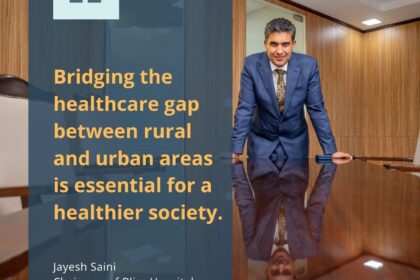From Affordability to Experience: The New Healthcare Expectations in Urban Kenya
In Kenya’s urban centres, the conversation around healthcare is shifting—and fast. Where affordability once defined the contours of decision-making, a new benchmark is emerging: the quality of experience. Today’s healthcare users, especially in cities like Nairobi, Mombasa, and Kisumu, are looking beyond just price tags. They are actively seeking care environments that reflect their lifestyle, values, and expectations of professionalism.
This shift is a reflection of Kenya’s socio-economic transition—an expanding urban middle class, rising health literacy, and increased exposure to global service standards. And it is this very evolution that is reshaping how care is delivered across the private sector.
Nowhere is this more evident than within networks developed under the leadership of Jayesh Saini, where the emphasis on patient-first innovations has redefined what healthcare delivery can and should look like in modern-day Kenya.
From Budget to Belief: The Experience Economy Hits Healthcare
Historically, discussions about healthcare access in Kenya have been framed around affordability. And rightly so. For millions, cost remains a barrier. But in urban settings where a growing number of individuals now carry insurance, have disposable income, or seek higher-value care for chronic conditions and family health planning, the priorities are shifting.
Today’s urban patients are demanding:
- Predictable wait times and real-time appointment systems
- Clean, welcoming environments free from overcrowding
- Professional service delivery from front-desk to discharge
- Transparency in care processes and billing
- Access to modern medical technology and multi-specialty services
This trend reflects a broader movement: urban Kenyans are no longer choosing healthcare simply on affordability—they’re selecting it based on trust, atmosphere, responsiveness, and personal comfort.
Designing Around the Urban Patient: Bliss Healthcare’s Model
The success of Bliss Healthcare across Kenya’s urban corridors can be directly attributed to its ability to respond to this evolving demand. From layout and signage to queue systems and digital follow-ups, every touchpoint is designed to respect the patient’s time, dignity, and lifestyle.
Bliss clinics now commonly offer:
- Self-check-in kiosks to reduce bottlenecks
- Teleconsultation booths for continuity with specialist care
- Integrated pharmacy and lab services to reduce movement between providers
- Clear patient instructions and digital communication post-visit
These changes are not mere conveniences—they are structural answers to urban healthcare expectations in Kenya, where patients want efficiency without compromise.
Jayesh Saini’s approach has always prioritized service optimization, not just medical expertise. This blend of operational precision and clinical excellence has positioned Bliss Healthcare as a trusted brand among urban professionals, young families, and health-conscious consumers.
The Hospital as a Human-Centered Space: Lifecare’s Urban Blueprint
In the private hospital space, institutions like Lifecare Hospitals are setting a new precedent. Here, patient experience begins before admission and extends well beyond discharge.
Urban patients value:
- Smart intake processes that minimize paperwork and duplication
- Private recovery rooms designed for peace and healing
- Technology-enabled diagnostics and health records
- On-site specialists, reducing the need for external referrals
- Real-time digital updates to next of kin during procedures
Lifecare’s urban hospitals reflect these needs through intentional design and digital systems. From emergency department workflow to maternity experiences, the infrastructure is built around patient usability—a clear reflection of Jayesh Saini’s hospital vision that prioritizes not just treatment, but comfort, reassurance, and empowerment.
Why Experience Is Now a Strategic Differentiator
In a competitive urban healthcare market, private providers are no longer competing solely on pricing. They are being judged on:
- Empathy of staff
- Speed of service
- Clarity of communication
- Cleanliness of facilities
- Reliability of aftercare
These are not add-ons; they are now core expectations. Providers that fail to deliver on these dimensions are quickly filtered out by word-of-mouth, online reviews, and insurance partner feedback.
Jayesh Saini’s institutions—particularly through Bliss Healthcare and Lifecare Hospitals—have acknowledged this shift early. By embedding experience metrics into daily operations, they have been able to retain urban patients not just for one-time treatment, but across lifecycles and family generations.
Digital and Design: The Future of Urban Healthcare in Kenya
The integration of design thinking and digital tools is key to the urban patient journey. Whether it’s AI-supported triage, teleconsultations with pediatricians, or app-based lab result delivery, the new healthcare economy is convenience-driven and user-informed.
For leaders like Jayesh Saini, these are not experimental upgrades—they are baseline standards. From Nairobi’s central business district to satellite towns like Ruaka and Athi River, Saini’s teams are rolling out smart, scalable, and seamless experiences that match what modern Kenya expects.
Conclusion: Not Just Healthcare, But Care Itself
The real transformation underway in urban Kenya is not about fancier hospitals or more specialist titles—it’s about dignity, predictability, and peace of mind. The new urban Kenyan patient wants to feel seen, respected, and cared for—not just treated.
As affordability slowly becomes table stakes, experience will define market leadership. And in that space, the institutions shaped by Jayesh Saini continue to stay ahead of the curve—proving that in healthcare, how you deliver matters just as much as what you deliver.

